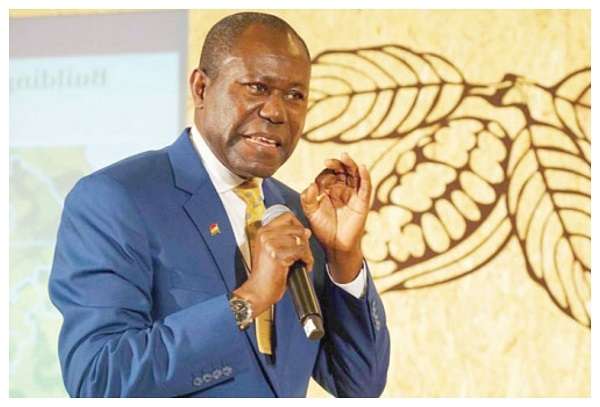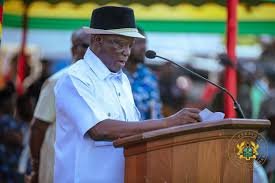Joseph Boahen Aidoo, CEO of Cocobod, has disclosed that the organization has recorded a substantial profit of over GH₵2 billion for the 2022/2023 fiscal year, a notable improvement in its financial performance and a demonstration of its ability to thrive in challenging market conditions.
Mr. Aidoo noted that despite inheriting significant financial hurdles upon taking office, Cocobod has successfully reversed its fortunes, achieving a remarkable turnaround that has resulted in substantial revenue growth for the industry.
“Today, the industry has survived and Cocobod today is healthy. In 2022/2023, we made over GH₵2 billion in profit. Currently, it is at the management level; once it passes through the board, it will be published and everybody will know. So we’ve turned things around”.
Joseph Boahen Aidoo
Mr. Aidoo’s announcement marks a dramatic turnaround for Cocobod, which had previously reported a staggering loss of GH₵2 billion in 2021, highlighting the organization’s remarkable recovery and newfound financial stability.
According to Mr. Aidoo, the loss was a deliberate consequence of a strategic choice to prioritize farmer payments, even amidst financial difficulties, demonstrating the organization’s commitment to supporting its farmers despite the challenging circumstances.
“This is because we were torn between the national interest and the Cocobod interest, the national interest here is the cocoa industry itself.” – Joseph Boahen Aidoo
The CEO emphasized that the cocoa industry is the lifeblood of Ghana’s economy, and therefore, Cocobod had a sacred responsibility to prioritize the nation’s long-term interests over its own short-term financial gains, in order to protect the cocoa farming sector from further decline and ensure its sustainability.
“If we chose the interest of Cocobod, the only thing we could have done was to reduce the farmer’s price at a time when illegal mining was about to explode, at a time when farmers were cutting cocoa in the Brong Ahafo region to cultivate cashew, in the Eastern Region, farmers were cutting down cocoa to cultivate rubber. And we all know the Eastern Region has the best soils in Ghana to cultivate cocoa”.
Joseph Boahen Aidoo
Cocobod’s Financial Struggles
Furthermore, Joseph Boahen Aidoo revealed that he inherited significant financial hurdles when he took office in January 2017, facing a daunting task to revamp the organization’s financial stability.

Mr. Aidoo disclosed that despite the previous administration’s securing of a $1.8 billion loan in 2016, he inherited an empty coffers when he took the reins at Cocobod in January 2017, with no funds left to continue the organization’s operations.
He explained that the funds had been depleted due to the high cost of cocoa purchases and other operational expenditures, resulting in an empty treasury when he took the helm at Cocobod.
“They bought about 600,000 metric tonnes before we came in. With cocoa, the peak harvest period is October, November, December, and January. So within the first quarter of the season, from October to December 2016, the previous administration bought over 600,000 metric tonnes”.
Joseph Boahen Aidoo
Mr. Aidoo revealed that upon taking office, Cocobod was confronted with the immense challenge of sustaining cocoa purchases without any available funds, posing a significant threat to the organization’s operations and the livelihoods of cocoa farmers.
According to Mr. Aidoo, the most feasible solution was for Cocobod to approach the Bank of Ghana for support, which would provide the necessary financial backing to sustain cocoa purchases and ensure the sector’s continued viability.
“We were forced to go to the Bank of Ghana to borrow. Within that period, we bought over 300,000 metric tonnes and we had to pay the farmers, we had to pay for haulage, the buyer’s margin, and operational costs. We sought help from the Bank of Ghana who became an intermediary between the Board and the consolidated banks and we got over GH₵2 billion”.
Joseph Boahen Aidoo
Meanwhile, Ghana’s cocoa industry has been beset by a trio of challenges: severe weather conditions, devastating bean diseases, and the encroachment of illegal gold mining, which has led to the widespread displacement of cocoa farms and threatened the sector’s productivity.
READ ALSO: Conservatives Rally to Block Labour’s Potential Supermajority























